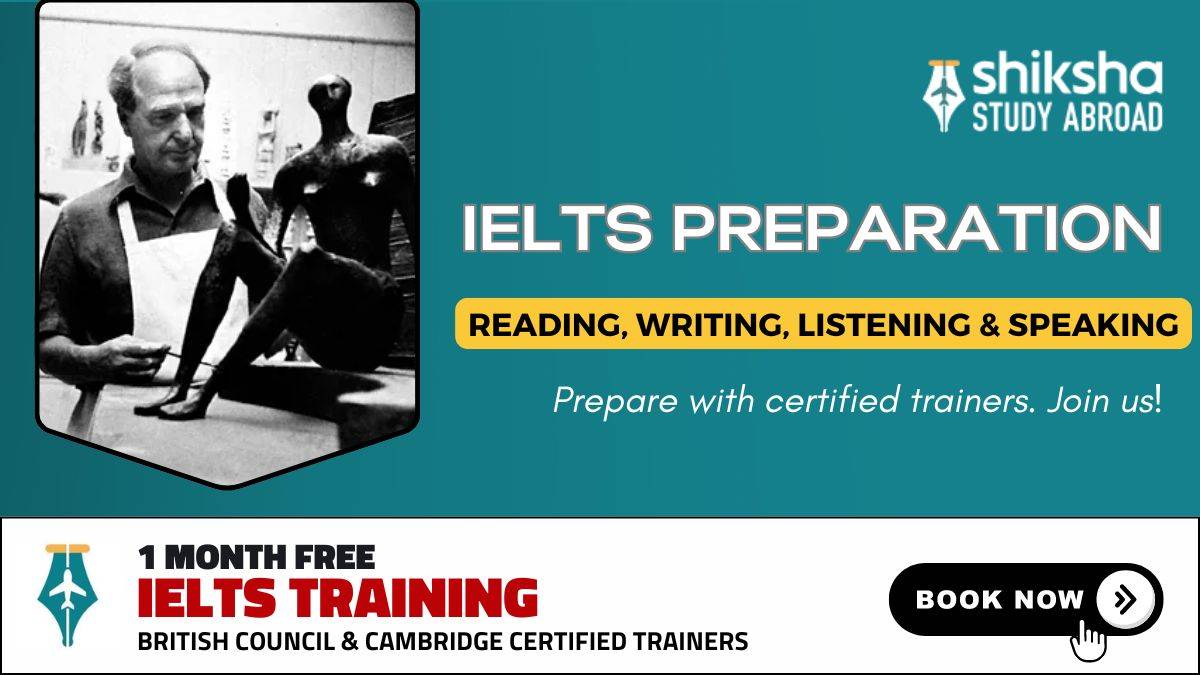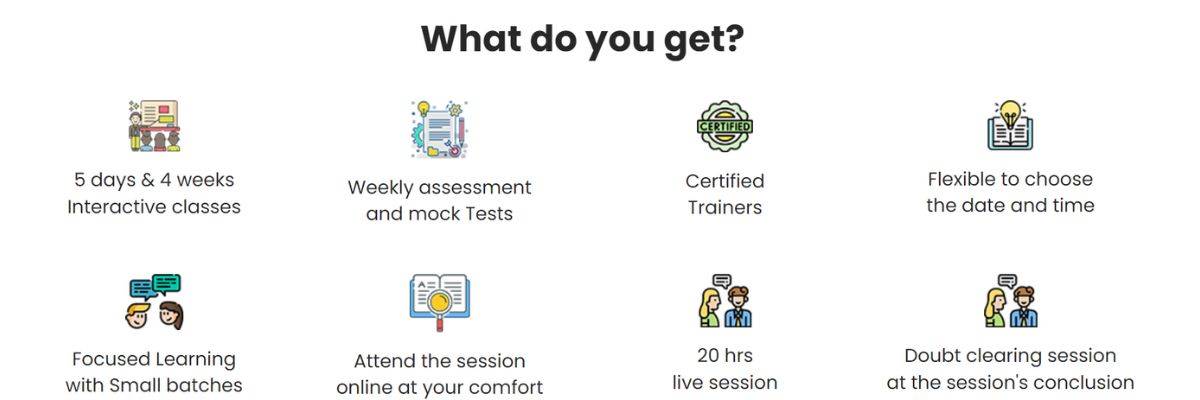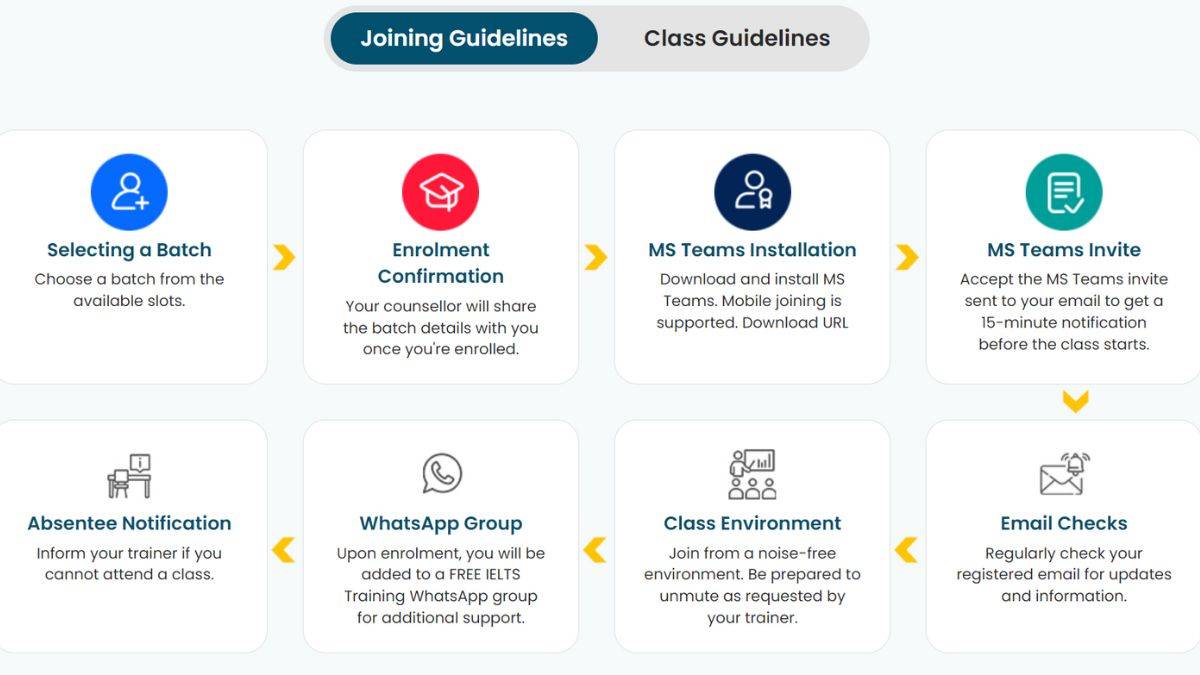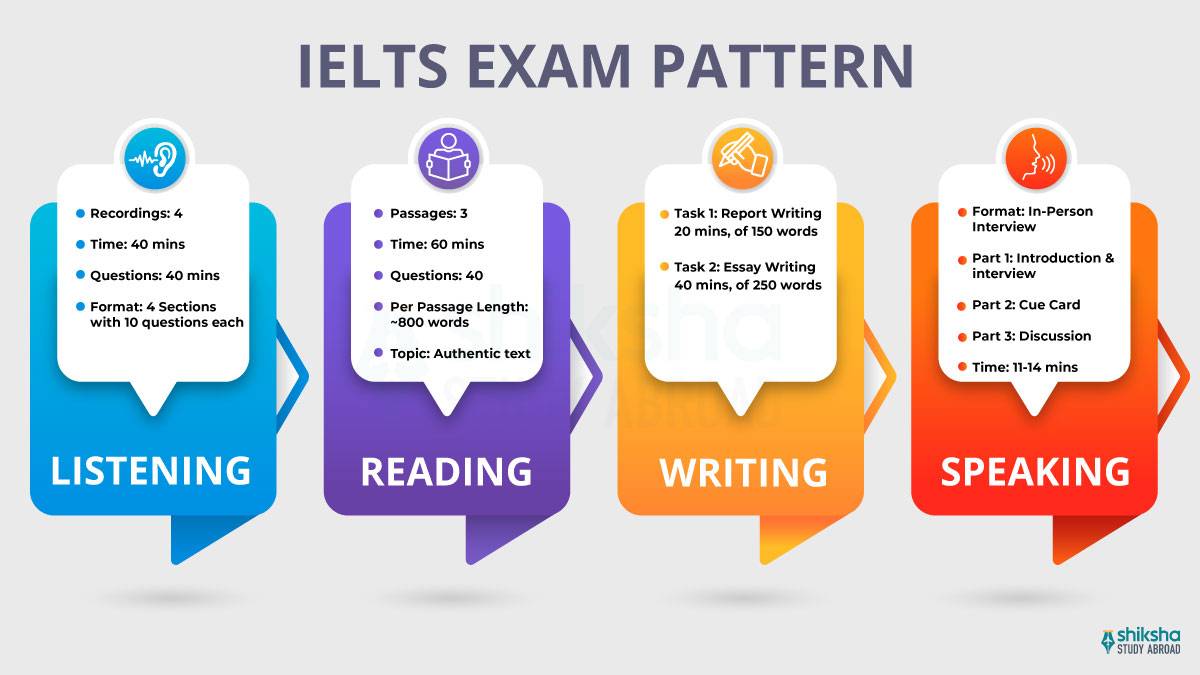
The International English Language Testing System (IELTS) exam assesses candidates listening, reading, speaking, and writing skills. Candidates who wants to score well in their IELTS exam should know how to prepare of IELTS. One can check the tips and refer to study guide for IELTS Reading, Listening, Speaking & Writing to get good band score. For IELTS preparation, one can either prepare for IELTS exam at home or even join IELTS coaching classes.
To understand the IELTS exam preparation, applicants must first understand the IELTS test. Applicants can go through the content of the test and check, which type of questions are asked in each section. Once this is done, applicants can look at the IELTS Preparation Tips 2025. The applicants will have to prepare for the following four sections of the IELTS exam:
Applicants looking at IELTS preparation at home can sign up for our Free IELTS Classes by Shiksha.com. These classes are taken by British Council and Cambridge certified language experts.
From IELTS tips and tricks for reading to effective IELTS tips and tricks for writing, we will guide you through all the necessary steps to sharpen your skills and boost your confidence. In this article, we will inform you on how to prepare for IELTS, section-wise and what materials you would need for IELTS preparation. We will also inform you on how to prepare for IELTS at home. One can also check How to Score 6.5 in IELTS.
Commonly asked questions
Q: What is the syllabus of IELTS exam?
Q: Can I prepare for IELTS test within 2 weeks?
Although two weeks are less, however, with a solid strategy can help you get a decent IELTS score. Candidates should understand the IELTS test format and prepare a comprehensive study plan for the next two weeks covering all the topics. After covering all the topics in each of the sections give full-length practice tests.
Q: How to start preparing for IELTS?
Beginners should start preparing for IELTS by following these points:
- Step 1: Choose the right IELTS test
- Step 2: Familiarise yourself with the test
- Step 3: Learn about the question types
- Step 4: Understand the band scores
- Step 5: Study and set goals
- Familiarise yourself with the band scores
- Asses your English skills
- Make English a habit
- Set up a study plan
- Read English newspapers, books, journals, advertisements and books
- Listen to English-speaking audio books, podcasts, radio and music
- Speak to colleagues, friends and family in English
- Learn a new word every day or week and practice using it in a sentence
- Step 6: Know what to expect on test day
- Arrive early to allow time to register and be seated for your test
- Check in your personal belongings such as phones, smart watches, books and notes
- Bring your personal identification which is needed for the check-in process
Q: What are the best apps for IELTS preparation?
There are a lot of online resources available for IELTS preparation. Few IELTS apps that candidates can use to prepare for the IELTS test.
- IELTS Prep App, IELTS Word Power offered by British Council
- The Official Cambridge Guide IELTS mobile app
- The Vocab24 Vocabulary Builder app
- IELTS Prep App: This is an official IELTS app developed by British Council and can be used by both Android as iOS users
- BBC Learning English: One of the best apps to learn English. It is available on both Android and iOS platforms
Q: How can I prepare for IELTS at home?
Preparing for the IELTS exam at home might be sounding tedious but it is simple and effective if it is to be done in right ways. Below are the step-by-step guide to help you get ready for IELTS test day:
- The IELTS has four parts: Listening, Reading, Writing, and Speaking. Understanding how each part works will help you prepare better.
- Figure out what your strengths and weaknesses are in English. This way, you can focus on what you need to improve.
- Decide on a target score and create a study schedule. Make sure to spend time on each section of the test.
- Use good study materials to boost your IELTS preparation at home.
- One should practice English daily at their home with their friends, family, or relatives.
- Regularly do full-length IELTS practice tests to get used to the exam format and timing at home
- Join study groups or forums to share tips and get feedback from others.
- Free IELTS Training by Shiksha.com
- IELTS Mock Test Online
- IELTS Exam Pattern
- Key IELTS Preparation Tips for Reading
- Key IELTS Preparation Tips for Writing
- Key IELTS Preparation Tips for Listening
- Key IELTS Preparation Tips for Speaking
- IELTS Exam Band Criteria
- Best IELTS Preparation Tips
- How to prepare for IELTS Exam in one month?
- IELTS Preparation Strategies
- How to prepare for the IELTS exam at home?
- IELTS Study Materials 2025
- Understand the IELTS Exam Format 2025
- IELTS Test Tips: 30-day online preparation course
- IELTS Practice Test 2025
- IELTS Preparation Tips FAQs
Free IELTS Training by Shiksha.com
Shiksha Study Abroad has introduced a new, 1-month free online IELTS class to help students prepare for their IELTS Exam. Students associated with Shiksha get complementary free IELTS training for a month. This program aims to help students prepare to study abroad without additional costs.
The Free IELTS Classes by Shiksha.com have attracted over 3,000+ participants. Shiksha Study Abroad reports impressive results: 80% of students have achieved their goals, with the average participant achieving an IELTS score of 7.0.
Key Features of Free IELTS Training by Shiksha.com
Some of the key features of the Shiksha Study Abroad Free IELTS Training program typically include:
- Live online classes are accessible from anywhere and on any device
- 1 Month Free Training option to choose from Weekend and Weekday Batches
- Learn from experienced British Council and Cambridge-certified trainers
- Coverage of all IELTS modules: Reading, Writing, Listening, and Speaking
- Option for students to retake classes if needed at 0 cost
- Mock Tests for the students to practice before the exam
Commonly asked questions
Q: What is the duration of IELTS Free Class?
Shiksha offers a free one-month IELTS preparation course. Students can choose between weekday or weekend classes to fit their schedules. The course covers all four IELTS modules: reading, writing, speaking, and listening.
The programme consists of 20 one-hour sessions spread over the month. Each week focuses on a different module, ensuring comprehensive coverage of the IELTS exam content.
Q: How can I prepare myself for the IELTS exam at home?
Here's a structured plan to prepare for the IELTS exam at home using Shiksha.com's free online classes:
| Step | Action | Tips |
|---|---|---|
| Step 1: Enroll | Sign up for the 1-month free training programme on Shiksha.com. | - Choose a batch (weekday or weekend) based on your availability. |
| - Ensure your device and internet connection are ready for live classes. | ||
| Step 2: Attend Classes | Join live online classes covering all IELTS modules (Reading, Writing, Listening, Speaking). | - Participate actively and take detailed notes during sessions. |
| - Interact with British Council and Cambridge-certified trainers for clarity on concepts. | ||
| Step 3: Practice Skills | Use mock tests provided by Shiksha.com to practice each module under exam-like conditions. | - Set a timer to simulate the actual exam environment. |
| - Analyze your mistakes and work on weak areas. | ||
| Step 4: Retake Classes | Retake any missed or difficult classes at no additional cost. | - Focus on re-learning challenging topics or sections where you scored low in mock tests. |
| Step 5: Self-Practice | Supplement classes with independent study using free online resources from Shiksha.com, Cambridge, and others. | - Dedicate time daily for vocabulary building and grammar improvement. |
| - Use YouTube for additional listening and speaking practice (e.g., IELTS sample interviews). | ||
| Step 6: Review Feedback | Review trainer feedback on your performance and make improvements accordingly. | - Seek additional guidance from trainers for Writing and Speaking modules, as they often need personalised input. |
| Step 7: Final Prep | Take the final mock tests provided and assess readiness for the actual exam. | - Focus on time management and accuracy. |
Q: What happens after I signup for my free IELTS Class?
After you've signed up the consent. You'll get a link to join the free IELTS class. Also you be alloted a personal counsellor who will guide you with every detail about your class — from the schedule to what you should prepare before your first lesson. It’s like getting a personalised roadmap to IELTS success.
Q: What should I do if I am not able to attend the scheduled IELTS session?
If you're unable to attend a class, let your teacher know as soon as possible. This way, we can provide you with the session's materials and any additional support you need to catch up. It ensures you stay on track with your learning, even when life gets in the way.
Predict your IELTS, TOEFL, and PTE in just 4 steps!
IELTS Mock Test Online
IELTS Exam Pattern
IELTS test comprises four sections Reading, Writing, Listening, and Speaking. We have given the IELTS exam pattern below for reference:
| Sections with Duration |
Total Questions |
Total Time |
|---|---|---|
| IELTS Listening Section |
40 |
30 minutes |
| IELTS Reading Section |
40 |
60 minutes |
| IELTS Writing Section |
2 |
60 minutes |
| IELTS Speaking |
3 |
11-14 minutes |
Commonly asked questions
Q: What is the IELTS Listening section format?
The IELTS Listening section format is designed in the following manner:
Candidates listen to four recordings of native English speakers and then write their answers to the list of questions.
- Recording 1 - a conversation between two people set in an everyday social context
- Recording 2 - a monologue set in an everyday social context
- Recording 3 - a conversation between up to four people set in an educational or training context
- Recording 4 - a monologue on any academic subject
Types of IELTS Listening Questions
- Matching
- Multiple-choice questions
- Sentence completion
- Short answer questions
To improve your vocabulary check out: Vocabulary for IELTS
Q: What is the IELTS Reading section format?
Three long texts range from factual and descriptive to discursive and analytical. The texts are selected from magazines, journals, newspapers, and books for those looking to enter universities. Apart from the IELTS format, we have also given the types of questions below.
Types of IELTS Reading Questions
Q: What is the exam pattern of IELTS?
The IELTS exam pattern is divided into four sections namely: Listening, Reading, Writing and Speaking. All four sections have a different pattern which does not coincide with one another. The type of questions are also different for each of the sections on IELTS. Let us understand the IELTS exam pattern elaborated in the table below for Academic Test takers:
| IELTS Sections | No. of Questions Tested | Time | What is Tested? |
|---|---|---|---|
| Listening | 40 questions | 40 minutes | 4 audio recordings are played and questions are asked. |
| Reading | 40 questions | 60 minutes | 3 reading passages from academic purpose are tested followed by questions. |
| Writing | 2 tasks | 60 minutes | 2 writing tasks are tested of 150 and 250 words respectively. |
| Speaking | 3 parts | 11–14 minutes | 3 speaking tasks are given, applicants have to speak on the topic. |
Q: How is the IELTS Speaking section format designed?
The IELTS Speaking section monitors the spoken English of the candidate. Every test is recorded. Check out the format of the IELTS Speaking section below:
| Parts on IELTS Speaking | Description |
|---|---|
| IELTS Speaking Part 1: General Questions about the Candidate | The examiner will ask the test taker general questions about you and familiar topics like work, studies, or home. The first part is of four to five minutes. |
| IELTS Speaking Part 2: Cue Card + Follow-up Questions | The test taker will be given a card that asks him about a specific topic. Here, you will be given one minute to prepare before speaking for two minutes. The examiner will then ask one or two questions on the selected topic. |
| IELTS Speaking Part 3: Discussion with the Examiner | The test taker will be asked questions about the topic selected in Part 2. Here, you will get the opportunity to discuss more about the ideas and issues. This part lasts for four to five minutes. |
Applicants can prepare for the Speaking section on IELTS based on the above mentioned format.
Q: How can skimming and scanning improve reading efficiency in IELTS exam?
Skimming and scanning are two essential reading techniques that can significantly improve reading efficiency, especially in timed situations like the IELTS exam. Here's how each technique helps:
Skimming
- Purpose: Skimming is used to get a general idea of the content and structure of a text without reading every word.
- How It Works: When you skim, you basically read the introduction, headings, subheadings, and the first and last sentences of each paragraph. This allows you to understand and grasp the main themes and ideas.
- Benefits:
- Time-Saving: By quickly identifying key points, you save time while still understanding the overall context.
- Focus on Relevance: Skimming helps you decide which parts of the text are worth a closer read based on the questions you need to answer.
Scanning
- Purpose: Scanning is used to find specific information or details within a text.
- How It Works: When you scan, you look for keywords, phrases, or numbers related to the information you need. You move your eyes over the text quickly to locate this data.
- Benefits:
- Efficiency in Finding Data: Scanning allows you to locate answers to questions without having to read through entire sections, which is especially useful for quickly answering specific queries.
- Highlighting Key Information: It helps identify important details like dates, names, statistics, or definitions, allowing for a more targeted reading approach.
Impact of Skimming and Scanning on Reading Efficiency
By incorporating skimming and scanning into your reading practices, you can significantly enhance your ability to process large volumes of text quickly and effectively. This is crucial in exam environments where time is limited. Mastering these skills will allow you to tackle reading passages more confidently and increase your chances of answering questions accurately within the allotted time.Skimming and scanning are essential reading techniques that can significantly improve reading efficiency, especially in timed tests like the IELTS. Here's how each technique contributes:
Skimming
Definition: Skimming involves rapidly moving your eyes over the text to get a general idea of its content without reading every word.
Benefits:
- Quick Overview: It helps you grasp the main ideas, themes, and structure of the passage, allowing you to better understand the context before you dive deeper into specific details.
- Time-Saving: This technique allows you to read through passages quickly, enabling you to allocate time more efficiently across all questions.
- Identifying Keywords: While skimming, you can notice keywords, phrases, or sections that seem relevant to the questions, which can guide your focused reading later on.
Scanning
Definition: Scanning is a technique used to locate specific information or details within the text quickly.
Benefits:
- Finding Information: This method enables you to quickly locate dates, names, statistics, or answers to particular questions without reading everything.
- Efficient Focus: By knowing what information you need, you can target your search within the text, reducing the time spent reading irrelevant parts.
- Avoiding Information Overload: Scanning helps you filter out unnecessary information, allowing you to concentrate only on what is pertinent to the questions.
Combined Use
Using skimming and scanning together enhances your overall reading efficiency. Start with skimming to understand the passage's general idea and structure, then use scanning to find specific answers or details. This two-step approach allows you to maximize your comprehension while minimizing the time spent on reading, which is crucial during exams like the IELTS. By practicing these techniques, you can improve your ability to handle complex texts more efficiently.
Q: What is IELTS Writing section format?
The topics in the Writing section are test takers who are suitable for undergraduate and postgraduates looking to get into universities.
IELTS Writing Task 1 - The test taker gets 60 minutes to complete both tasks. One task is for 20 minutes and the other is for 40 minutes. On the IELTS Academic Module, in Task 1, a candidate has to write a summary of at least 150 words of a:
Any of the above-given types of questions can be tested, thus applicants should be prepared for it.
IELTS Writing Task 2 - Task 2 is the same for both Academic and General Training Modules, and involves an essay of at least 250 words. Candidates will be asked to write an essay in response to an argument, problem, or point of view. Make sure to give responses to both tasks formally.
Key IELTS Preparation Tips for Reading
- If you are not able to solve a question, skip to another one. Come back later to finish it
- Carefully go through the graphs, images, or any figures while solving the questions. Focus on minor details
- Try to understand the passage questions carefully and find answers from the passage itself
- Use capital letters for answers
- Make sure you are to the point and grammatically correct
Important and Actionable IELTS Reading Tips
| Tip | Actionable Advice |
|---|---|
| 1. Time Management | Spend 20 minutes per passage. If stuck, move on and revisit tough questions later. |
| 2. Skim and Scan | Skim the passage for main ideas; scan for keywords or synonyms in the questions. |
| 3. Keyword Focus | Highlight keywords in questions; locate their synonyms or rephrased ideas in the text. |
| 4. Follow Word Limits | Strictly adhere to word limits (e.g., “No more than 2 words”). Spelling matters too! |
| 5. True/False/Not Given | Base answers only on the text. True = Matches, False = Contradicts, Not Given = No info. |
IELTS Reading Practice Test - Free
Key IELTS Preparation Tips for Writing
The IELTS Writing section comprises two subsections. Here, you need to write an essay expressing your point of view, and describe a diagram, chart, or graph. To achieve a high score in the IELTS Writing test, effective preparation is essential. Here are some valuable IELTS writing preparation tips to help you enhance your writing skills and perform well on the exam:
- Give a limited time to every task like 40 minutes for a lengthier task and 20 minutes for task 1
- Try to write more than 150 words for the first task and more than 250 words for the second task
- Make sure you give a conclusion for task 2
- Avoid repeating words and phrases
- Avoid passive voice and use active voice
- Write to the point and avoid writing lengthy sentences
- Proofread before submitting
Online IELTS Writing Practice Tests, Sample - Free
| Dictation Words for IELTS | IELTS Exam: Connectors for Task 1 |
Key IELTS Preparation Tips for Listening
The IELTS listening section evaluates how well you understand the language. It has four sections and includes 40 questions. Ensure your headphones are working properly, if not then inform the examiner and change them with a working one. To excel in the IELTS Listening test, effective preparation is key. Here are some valuable IELTS listening preparation tips to help you enhance your listening skills and perform well on the exam:
- Utilize the allotted time to read the questions before the recording starts
- Make notes on the question paper when listening to the recording
- Listen to the recording carefully and try to focus on the answers. The recording will be played only once
- Give answers within the word limit
- Use capital letters for all answers
- Proofread for grammar errors and spelling mistakes before submitting
IELTS Listening Preparation Guide - Free
Key IELTS Preparation Tips for Speaking
In the IELTS Speaking section, you need to interact live with an examiner. This section analyses how well you spoke the English language. Here, you need to interact with the examiner, so, you need to be spontaneous. It is divided into three parts. Some valuable IELTS speaking preparation tips to help you enhance your speaking skills and perform well on the exam are mentioned below:
- Listen to the questions carefully and answer directly
- Try to speak slowly (so, the examiner can listen to you) and fluently
- Be confident while speaking
- Make sure your answers remain relevant
- Ask to repeat the question only if it is required
- Focus on the vocabulary you are using, grammar, and sentence structure
- Try not to take long pauses
IELTS Speaking Practice Questions and Sample tasks - Free
Also Read: FAQs for IELTS Exam
IELTS Exam Band Criteria
Best IELTS Preparation Tips
Download this guide to read it offline
How to prepare for IELTS Exam in one month?
IELTS Preparation Strategies
How to prepare for the IELTS exam at home?
IELTS Study Materials 2025
Understand the IELTS Exam Format 2025
IELTS Test Tips: 30-day online preparation course
IELTS Practice Test 2025
IELTS Preparation Tips FAQs
Commonly asked questions
Q: Which is the hardest section to prepare in IELTS exam?
There may not be a specific answer to this question as it varies from person to person. Somebody may find the Writing section the most difficult for preparation while some may find Speaking the hardest. It is better one should go through the IELTS exam pattern and understand each and every section and figure out the toughest section based on preparation and focus more on that.
Q: Can I pass IELTS exam without studying?
Those who want to give the IELTS test without studying should take some of the IELTS practice tests and then decide whether they need to prepare for the exam or they can give it without studying.
Q: Can IELTS test be taken without coaching?
For some candidates it is important to have a mentor and a regular study plan with fixed timing to prepare for the exam. IELTS test may seem a piece of cake to many but at the same time, it can be difficult for some after knowing its complexities. Candidates can go through the exam pattern and check the topics they need to cover. If you think you need tutoring for preparation then go for coaching or else go for self-study.
Comments
(1289)
3 months ago
T
9 months ago
R
9 months ago
R
a year ago
M
a year ago
R
a year ago
Hello Mustafijur. If you are looking for assistance with applying to universities abroad. Get in touch with our Shiksha Study Abroad Counsellors and book a counselling session absolutely free, Click Here
a year ago
R
a year ago






